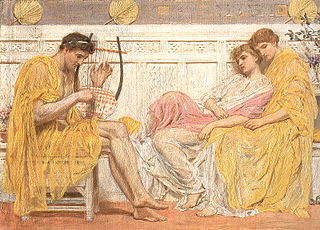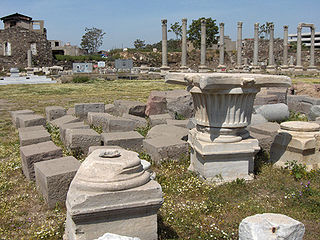This page is based on this
Wikipedia article Text is available under the
CC BY-SA 4.0 license; additional terms may apply.
Images, videos and audio are available under their respective licenses.
Latin literature includes the essays, histories, poems, plays, and other writings written in the Latin language. The beginning of Latin literature dates to 240 BC, when the first stage play was performed in Rome. Latin literature would flourish for the next six centuries. The classical era of Latin literature can be roughly divided into the following periods: Early Latin literature, The Golden Age, The Imperial Period and Late Antiquity.

The 1st millennium BC is the period of time between from the year 1000 BC to 1 BC .
It encompasses the Iron Age in the Old World and sees the transition from the Ancient Near East to classical antiquity.
Apollodorus was a popular name in ancient Greece. It is the masculine gender of a noun compounded from Apollo, the deity, and doron, "gift"; that is, "Gift of Apollo." It may refer to:
Antimachus of Colophon, or of Claros, was a Greek poet and grammarian, who flourished about 400 BC.

Mimnermus was a Greek elegiac poet from either Colophon or Smyrna in Ionia, who flourished about 630–600 BC. He was strongly influenced by the example of Homer yet he wrote short poems suitable for performance at drinking parties and was remembered by ancient authorities chiefly as a love poet. Mimnermus in turn exerted a strong influence on Hellenistic poets such as Callimachus and thus also on Roman poets such as Propertius, who even preferred him to Homer for his eloquence on love themes. His work was collected by Alexandrian scholars in just two "books" and today only small fragments survive. The fragments confirm the ancient estimate of him as a "consummate poet" but also indicate that he was a "sturdier character" than the indulgent love poet he was assumed to be by various ancient commentators. Almost no reliable, biographical details have been recorded. One ancient account linked him romantically with a flute girl who subsequently gave her name, Nanno, to one of his two books.
Tyrtaeus was a Greek lyric poet from Sparta who composed verses around the time of the Second Messenian War, the date of which is not clearly established, but sometime in the latter part of the seventh century BC. He is known especially for political and military elegies, exhorting Spartans to support the state authorities and to fight bravely against the Messenians, who had temporarily succeeded in wresting their estates from Spartan control.

The ancient Greek drama was a theatrical culture that flourished in ancient Greece from 700 BC. The city-state of Athens, which became a significant cultural, political, and military power during this period, was its center, where it was institutionalised as part of a festival called the Dionysia, which honored the god Dionysus. Tragedy, comedy, and the satyr play were the three dramatic genres to emerge there. Athens exported the festival to its numerous colonies.
Callistratus may refer to:
Asclepiades is the name of:
The Alexandrian school is a collective designation for certain tendencies in literature, philosophy, medicine, and the sciences that developed in the Hellenistic cultural center of Alexandria, Egypt during the Hellenistic and Roman periods.
Choerilus of Samos was an epic poet of Samos, who flourished at the end of the 5th century BC.
Choerilus was an Athenian tragic poet, who exhibited plays as early as 524 BC.
The Alexandrian Pleiad is the name given to a group of seven Alexandrian poets and tragedians in the 3rd century BC working in the court of Ptolemy II Philadelphus. The name derives from the seven stars of the Pleiades star cluster.
Philoxenus of Cythera was a Greek dithyrambic poet, an exponent of the "new music."
Homerus of Byzantium was an ancient Greek grammarian and tragic poet. He was also called ho Neoteros, to distinguish him from the older Homerus (Homer).
The Alexandrine grammarians were philologists and textual scholars who flourished in Hellenistic Alexandria in the 3rd and 2nd centuries BCE, when that city was the center of Hellenistic culture. Despite the name, the work of the Alexandrine grammarians was never confined to grammar, and in fact did not include it, since grammar in the modern sense did not exist until the first century BC. In Hellenistic and later times, "grammarian" refers primarily to scholars concerned with the restoration, proper reading, explanation and interpretation of the classical texts, including literary criticism. However unlike Atticism, their goal was not to reform the Greek in their day.
Semonides of Amorgos was a Greek iambic and elegiac poet who is believed to have lived during the seventh century BC. Fragments of his poetry survive as quotations in other ancient authors, the most extensive and well known of which is a satiric account of different types of women which is often cited in discussions of misogyny in Archaic Greece. The poem takes the form of a catalogue, with each type of woman represented by an animal whose characteristics—in the poet's scheme—are also characteristic of a large body of the female population. Other fragments belong to the registers of gnomic poetry and wisdom literature in which the Hesiodic Works and Days and the Theognidea are classed, and reflect a similarly pessimistic view of the human experience. There is also evidence that Semonides composed the sort of personal invective found in the work of his near contemporary iambographer Archilochus and the later Hipponax, but no surviving fragment can be securely attributed to such a poem.







